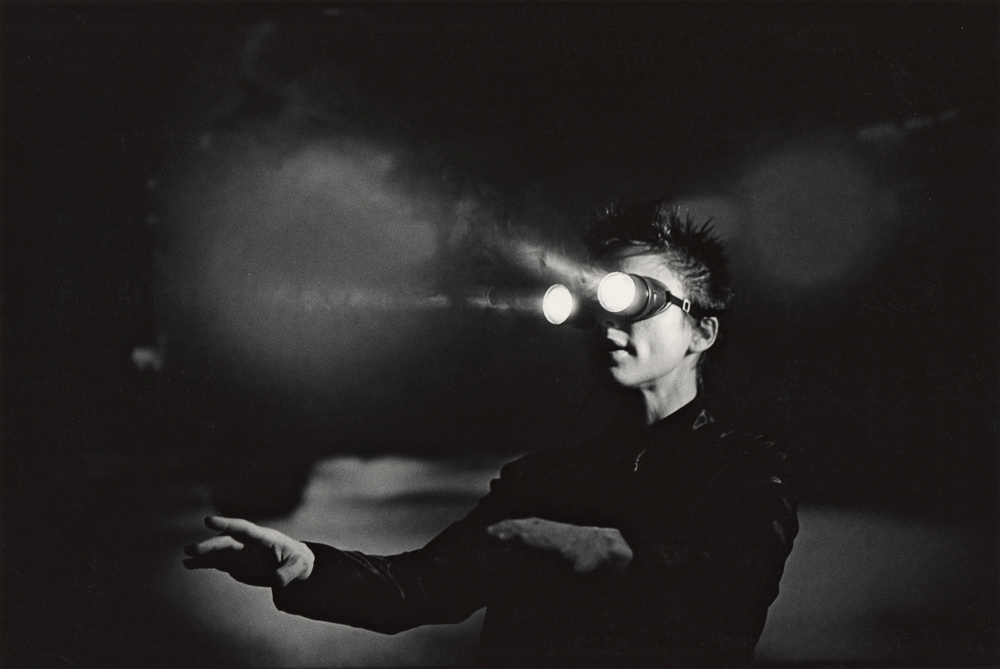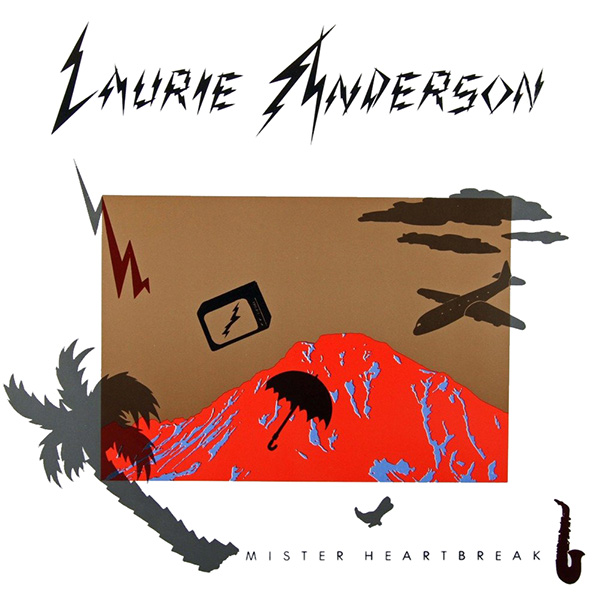Pynchon Music: Laurie Anderson
Why This Sky?
I wrote [Thomas Pynchon] a letter proposing doing an opera based on “Gravity’s Rainbow.” I got a beautiful letter from him saying he’d be delighted, but with one stipulation: that it be scored for solo banjo. Some people have a great way of saying “no way.” At some point I’d like to try again to see if he’s expanded the instrumentation.
—Laurie Anderson, 2004
Laurie Anderson (b. 1947)
Famous New York performance artist Laurie Anderson dedicated a song called “Gravity’s Angel” on her album Mister Heartbreak (Warner Brothers, 1984) to Thomas Pynchon. The album is among her most diverse and fully-realized, profoundly influenced as she was by her collaborations with Adrian Belew and William S. Burroughs. Belew, currently reunited with King Crimson, was well-known for his rubber stretch-guitar, virtuoso twang-bar work, and singular torturing of his Fender with various kitchen utensils in Anderson’s major-release performance film Home of the Brave; and Burroughs, the bad man of American fiction, provided her with dangerous vocal talents fresh from the Interzone. Other noteworthy contributors to the album included Peter Gabriel, who did a duet with Anderson in the song “Excellent Birds,” Nile Rogers, Phoebe Snow, David Van Tieghem, Bill Laswell, and Anton Fier, prolific percussionist who has played in bands as diverse as the Golden Palominos, Los Lobos, and Pere Ubu. Possibly the best song on the entire album was not the Pynchon piece, but, rather, the wonderful “Sharkey’s Day.”
Anderson has made her interest in Thomas Pynchon well known in interviews, including this excerpt from a 1997 review with Silicon Valley Radio:
John Papageorge: Who are some artists you admire and why?
Laurie Anderson: Thomas Pynchon I admire very much. And now I’m using “artist” in the broadest sense of the word. Gravity’s Rainbow is just so beautiful because it’s very multidimensional. I really like books that you can kind of hear as much as think about, that are so graphic and visual. I wanted to make an opera of that book, actually, and I wrote to him and asked him if that would be OK (I actually found him; he’s quite reclusive). And he wrote me this funny letter. He said, “You can do it, but you can only use banjo.” And so I thought, “Well, thanks. I don’t know if I could do it like that.” I suppose it was his polite way of saying, “No. No way can you do this.” Anyway, other artists that I like—I like William Burroughs for his voice. I’m almost at a loss to say that, because I so much appreciate it when anybody tries to make something and tries to be an artist that I’m happy to see the work. The only stuff I don’t really like are Broadway musicals. I hate them.
Anderson would tell the Pynchon anecdote many times, incorporating it into her performances in the early 2000s. Sadly, she never renewed her attempts to win Pynchon’s favor, instead turning to Moby-Dick for the subject of her multi-media opera.
Lyrics
Gravity’s Angel (For Thomas Pynchon)
You can dance. You can make me laugh. You’ve got X-ray eyes.
You know how to sing. You’re a diplomat. You’ve got it all.
Everybody loves you.
You can charm the birds out of the sky. But I, I’ve got one thing.
You always know just what to say. And when to go.
But I’ve got one thing. You can see in the dark.
But I’ve got one thing: I loved you better.
Last night I woke up. Saw this angel. He flew in my window.
And he said: Girl, pretty proud of yourself, huh?
And I looked around and said: Who me?
And he said: The higher you fly, the faster you fall. He said:
Send it up. Watch it rise. See it fall. Gravity’s rainbow.
Send it up. Watch it rise. See it fall. Gravity’s angel.
Why these mountains? Why this sky? This long road. This ugly train.
Well he was an ugly guy. With an ugly face.
An also-ran in the human race.
And even God got sad just looking at him. And at his funeral
all his friends stood around looking sad. But they were really
thinking of all the ham and cheese sandwiches in the next room.
And everybody used to hang around him. And I know why.
They said: There but for the grace of the angels go I.
Why these mountains? Why this sky?
Send it up. Watch it rise. See it fall. Gravity’s rainbow.
Send it up. Watch it rise. See it fall. Gravity’s angel.
Well, we were just laying there.
And this ghost of your other lover walked in.
And stood there. Made of thin air. Full of desire.
Look. Look. Look. You forgot to take your shirt.
And there’s your book. And there’s your pen, sitting on the table.
Why these mountains? Why this sky? This long road? This empty room?
Why these mountains? Why this sky? This long road? This empty room?
You know how to sing. You’re a diplomat. You’ve got it all.
Everybody loves you.
You can charm the birds out of the sky. But I, I’ve got one thing.
You always know just what to say. And when to go.
But I’ve got one thing. You can see in the dark.
But I’ve got one thing: I loved you better.
Last night I woke up. Saw this angel. He flew in my window.
And he said: Girl, pretty proud of yourself, huh?
And I looked around and said: Who me?
And he said: The higher you fly, the faster you fall. He said:
Send it up. Watch it rise. See it fall. Gravity’s rainbow.
Send it up. Watch it rise. See it fall. Gravity’s angel.
Why these mountains? Why this sky? This long road. This ugly train.
Well he was an ugly guy. With an ugly face.
An also-ran in the human race.
And even God got sad just looking at him. And at his funeral
all his friends stood around looking sad. But they were really
thinking of all the ham and cheese sandwiches in the next room.
And everybody used to hang around him. And I know why.
They said: There but for the grace of the angels go I.
Why these mountains? Why this sky?
Send it up. Watch it rise. See it fall. Gravity’s rainbow.
Send it up. Watch it rise. See it fall. Gravity’s angel.
Well, we were just laying there.
And this ghost of your other lover walked in.
And stood there. Made of thin air. Full of desire.
Look. Look. Look. You forgot to take your shirt.
And there’s your book. And there’s your pen, sitting on the table.
Why these mountains? Why this sky? This long road? This empty room?
Why these mountains? Why this sky? This long road? This empty room?
Additional Information
Track Listing
1. Sharkey’s Day (7:41)
2. Langue d’Amour (6:12)
3. Gravity’s Angel (6:02)
4. Kokoku (7:03)
5. Excellent Birds (3:12)
6. Blue Lagoon (7:03)
7. Sharkey’s Night (2:29)
2. Langue d’Amour (6:12)
3. Gravity’s Angel (6:02)
4. Kokoku (7:03)
5. Excellent Birds (3:12)
6. Blue Lagoon (7:03)
7. Sharkey’s Night (2:29)
Musicians
Laurie Anderson—vocals, synclavier; violin (on tracks 1, 7); whistle (1); vocoder, electronic conches (2); bell (3); percussion (4); artwork; graphics.
Bill Laswell—bass (except 2).
Adrian Belew—guitar (1, 3, 6, 7).
Anton Fier—drums (1, 7); toms, wood block (4).
Peter Gabriel—backing vocals (2, 3); vocals, synclavier and Linn drum (5).
David Van Tieghem—plywood, singing bowls, drums, Simmons (3); steel drum, gato, bamboo (6).
Daniel Ponce—percussion (1, 7).
November—backing vocals (1).
Sang-Won Park—kayagum (4).
Connie Harvey, Janet Wright—Japanese chorus (4).
Phoebe Snow, Atsuko Yuma—backing vocals (4).
Nile Rodgers—guitar (5).
Bill Blaber—soprano (6).
William S. Burroughs—vocals (7).
Laurie Anderson—vocals, synclavier; violin (on tracks 1, 7); whistle (1); vocoder, electronic conches (2); bell (3); percussion (4); artwork; graphics.
Bill Laswell—bass (except 2).
Adrian Belew—guitar (1, 3, 6, 7).
Anton Fier—drums (1, 7); toms, wood block (4).
Peter Gabriel—backing vocals (2, 3); vocals, synclavier and Linn drum (5).
David Van Tieghem—plywood, singing bowls, drums, Simmons (3); steel drum, gato, bamboo (6).
Daniel Ponce—percussion (1, 7).
November—backing vocals (1).
Sang-Won Park—kayagum (4).
Connie Harvey, Janet Wright—Japanese chorus (4).
Phoebe Snow, Atsuko Yuma—backing vocals (4).
Nile Rodgers—guitar (5).
Bill Blaber—soprano (6).
William S. Burroughs—vocals (7).
“Gravity’s Angel” — Listen to the song on YouTube.
Mister Heartbreak Wikipedia Page — You can read more about Mister Heartbreak on Wikipedia.
Laurie Anderson Wikipedia Page — You can read more about Laurie Anderson on Wikipedia.
Laurie Anderson Discog Page — Collects album covers and information on Laurie Anderson’s releases.
“Gravity’s Angels in America, or, Pynchon’s Angelology Revisited” — Pynchon Notes, 21 September 1998. Brian McHale discusses “Gravity’s Angel” at length.
SoundstreamSunday: “Gravity’s Angel” — 8 May 2016. Progarchy. Craig Breaden on Mister Heartbreak.
Mister Heartbreak Review — 1 June 2017. A nice review on the music blog Post Punk Monk.
“Thomas Pynchon’s Gravity’s Rainbow, the Laurie Anderson Opera That Never Came to Pass” — New York Daily News, 17 January 2017. Pynchon fan Alexander Nazaryan on the banjo opera that never was.
Books
Melody Sumner, et al. Burning Books, 1986.
William Duckworth. Schirmer Books, 1995.
Roselee Goldberg, Laurie Anderson. Harry N. Abrams, 1998.
Pynchon on Record
Return to the main music page
Authors: Dr Larry Daw & Allen B. Ruch
Last Modified: 25 November 2021
Main Pynchon Page: Spermatikos Logos
Contact: quail(at)shipwrecklibrary(dot)com
Last Modified: 25 November 2021
Main Pynchon Page: Spermatikos Logos
Contact: quail(at)shipwrecklibrary(dot)com



